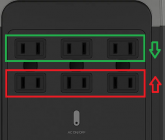Bob142
Build more, learn more.
Edited 1/24/2020 to remove inaccurate assertions and conclusion based on EcoFlow official response.
Wow. That's anegregious annoying error for a US$1,200 unit. I wonder if there are other errors that we can't see.
(Safety assertions and conclusion removed. They were incorrect and misleading.)
Wow. That's an
(Safety assertions and conclusion removed. They were incorrect and misleading.)
Last edited:



